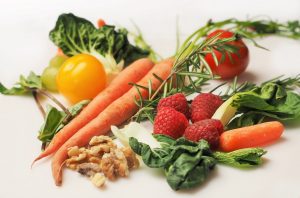Why is maintaining a healthy weight important?
As you get older, you might notice changes in your body’s make. You may get rid of muscle mass, which might increase frailty. You might also burn fewer calories, especially if you’re not very physically active. To avoid weight gain, you might have to eat fewer calories than you did when you were younger. This means you have fewer calories that will help you to get the nutrients your body needs for energy. Ask your healthcare provider about what a healthy weight is for you.
Among elderly people, being underweight is of concern and may be associated with not having enough to eat, not eating enough foods that are nutrient dense, or with an illness or disorder. Being overweight or obese is also of concern as additional weight may increase your risk for heart disease, high blood pressure, type 2 diabetes, and bone loss difficulties. Eating sensibly and being physically active to preserve bone and muscle may help you maintain strength and a healthy weight as you get older.
What’s a healthy weight for me?
Two standard measures for seeing if you’re at a healthy weight would be these:
The body mass index (BMI) is a measure of weight in relation to height. Even though a BMI score of 18.5 to 24.9 generally indicates a healthy weight for adults, the BMI is limited in how well it gauges body fat in elderly people or people who have lost muscle. Measuring about your waist may tell you in case you carry additional fat. A waist circumference of over 35 inches for women or 40 inches for men signifies increased risk for a variety of medical problems.
 Healthy Eating
Healthy Eating
What types of foods do I want to consume as I age? When you get older, your body starts to need fewer calories, but you want just as many nutrients. Nutrient-dense foods pack a good deal of vitamins, minerals, and other nutrients that your body needs to a small number of calories.
Control portion sizes
A portion is the amount of a single food you consume in one sitting. Lots of folks eat more than they want, especially when exercising or getting takeout. Try these tips:
- Avoid eating in front of the TV, computer, or other display. You might not notice how much you are eating when you are distracted.
- Read the Nutrition Facts label found on food and beverage packages to determine how many calories and how much fat are in one serving size of a product. Eating healthy meals can be easier when you plan ahead and make them more enjoyable.
- Cook ahead of time and freeze portions for days if you don’t need to cook.
- Keep canned or frozen vegetables, beans, and fruits available for fast and healthy meal add-ons. Rinse canned foods to eliminate additional salt. Drain juice and syrup from canned fruit to eliminate additional sugar.
- Eat frequently with someone you like. If you can not cook for yourself, contact the Eldercare Locator listed in the Resources section for neighborhood programs that provide meals.
- Ask your Doctor about healthful eating plans. You may want to check with your Doctor or dentist if;
- You locate chewing difficult, do not wish to consume, or have trouble with your dentures.
- You think that life events like the death of a loved one or moving out of your home are preventing you from eating well.
- You think that your medicines might be making your meals taste bad or affecting your desire.
- You think you should take a daily vitamin like iron or vitamin C.
How much physical activity do I need?
Keystone Health states that physical activity is good for your health at every age. When you’ve not been active, beginning regular physical action now may enhance your endurance, strength, balance, and can help the aged care gain strength. Being active may help you live by yourself for a longer time and keep you healthy. Being busy can be hard if your mobility is restricted or if you’ve got serious health issues. Nonetheless, you will find activities to fulfill your needs. Gradually raising your legs or arms, as an instance, can assist you when done on a regular, repeated basis.
Do various physical activities
Healthy older adults must do four kinds of activities frequently: aerobic (or endurance) exercise and actions to strengthen muscles, improve balance, and increase flexibility. For any new physical activity, in case you haven’t been active, start slowly and work up to your objective. To monitor your progress and stay motivated, keep a daily journal of everything you do and how long you do it. Many activities offer you more than only one benefit! Water aerobics with weights provides you strengthening and aerobic benefits. Yoga combines balance, flexibility, and strengthening. Pick what you like to do; some physical activity is better than none.
